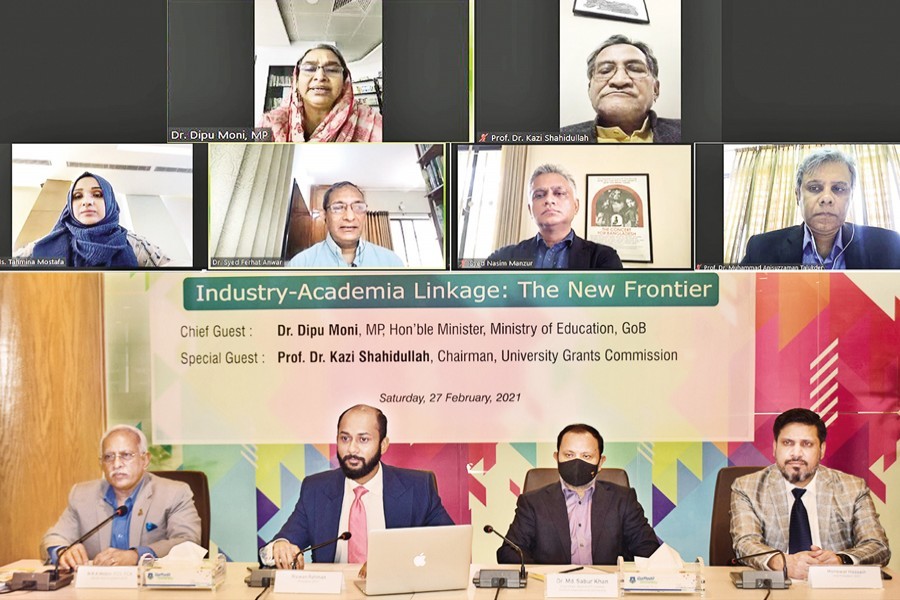
Published :
Updated :

A research and innovation ecosystem is imperative to accelerate the industry-academia linkage in order to create sector-specific skilled workforce in Bangladesh.
Tax incentive for financing research and development (R&D), spurring commercialisation of research, restructuring curriculum and doing detailed studies can bridge this gap.
Speakers made such observations and suggestions during a webinar styled 'Industry-Academia Linkage: The New Frontier' hosted by the Dhaka Chamber of Commerce and Industry (DCCI) on Saturday.
Education minister Dr Dipu Moni and University Grants Commission chairman Prof Dr Kazi Shahidullah spoke as the chief guest and the special guest respectively.
DCCI president Rizwan Rahman chaired the online event.
BUET Centre for Science and Engineering director Prof Dr Muhammad Anisuzzaman Talukder, Dhaka University IBA director Prof Dr Syed Ferhat Anwar, Apex Footwear Ltd managing director Syed Nasim Manzur and Meghna Group director Tahmina Binthe Mostafa also spoke.
Daffodil International University (DIU) Board of Trustees chairman Dr Md Sabur Khan presented a keynote.
Dr Moni emphasised a changed mindset for a better industry-academia link as both parties sometimes blamed each other for a mismatch in human capital.
She urged the private sector to invest more in the education sector for a sustainable and commercially viable research ecosystem.
Universities should not focus on education and degree only, the minister said, they have to provide industry-centric training as well.
She suggested doing a mapping of required skills set for the industry to reduce its gap with the academia.
Socio-economic impacts aside, Dr Moni said, Covid-19 has created opportunities like a tripartite collaboration among government, industry and academia to develop a research ecosystem for industrialisation.
To support more industry-centric R&D at academia, Mr Manzur sought tax incentive for R&D, modernising the Intellectual Property Rights (IPR) Act and encouraging commercialisation of research and innovation.
"Universities in western countries like the USA get funds from affluent people and corporate entities mainly for tax incentives for R&D funding which is absent in Bangladesh," he said.
Funding scarcity is probably not the only constraint towards doing research here, Mr Manzur said, it is rather the absence of a research ecosystem.
Giving an instance, he said Apex Footwear contacted the developers of an eco-friendly biodegradable jute bag to replace all its shopping bags.
"We persuaded them to sell the bag, not the technology. After a year, we came to know that they were awaiting government funds to establish a factory for commercial production."
"Do you think shareholders of my company want to wait that long? Absolutely not," added Mr Manzur.
The relevant agency had thus missed a chance of commercialising a great innovation that way, he stated.
The businessman said the development of a vaccine by Oxford University and AstraZeneca could be the biggest example of the industry-academia linkage from which Bangladesh could learn a lot.
About hiring skilled workers from abroad, he said Bangladeshi firms hire foreigners for two key reasons, with the first being their experience compared to the relatively younger industries here.
He said it was also hard to find industry-specific skilled workforce in the local market.
Citing a paltry Tk 1.53-billion R&D budget at local universities which is barely less than 0.01 per cent of GDP, Mr Manzur said Bangladesh ranked 112th out of 138 countries in the Global Knowledge Index-2020.
There is no reason to ask why, he went on to say.
DCCI chief Mr Rahman said fourth industrial revolution-led rapid technological progress, digitisation and SDG-centric transformation are reshaping the economic landscape of Bangladesh, including industries and jobs.
Graduates are struggling in the job market as the conventional education system lacks orientation of skills in line with industrial demands, he added.
Bangladesh is a land of 63.5-million labour forces and is growing at 2.2 per cent, meaning around 2.0-million new entrants join the force every year, he uttered.
But the 38.6-per cent unemployment among the graduates indicates a mismatch of skills, Mr Rahman said.
"Universities and the private sector need to work together to convert the youth into a skilled human capital to take advantage of the demographic dividend."
Urging entrepreneurs to invest CSR fund in research and education, Prof Shahidullah called the universities to frame out a timely and internationally standard curriculum which would benefit local industries.
"If we can create skilled manpower," he said, "we'll not require any mid-level managers recruited from abroad."
The keynoter Dr Khan said there is no data to know which industry needs how much skilled workforce for a distinct lack of collaboration among the government, industry, and academia.
"While the government can provide policy support to industries to fund more in R&D," he said, "industries and affluent individuals should also be in close contact with universities to fund research and innovations that are commercially viable."
ahb_mcj2009@yahoo.com


 For all latest news, follow The Financial Express Google News channel.
For all latest news, follow The Financial Express Google News channel.